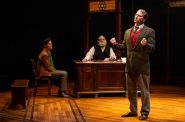The Florentine Opera’s Carmen and Don Jose
Funny, friendly Audrey Babcock and Noah Stewart, as opera's top dysfunctional couple in Bizet's "Carmen" at the Florentine.

Audrey Babcock as the Florentine’s Maddalena in Rigoletto, with Arturo Chacon-Cruz. Florentine photo by Richard Brodzeller.
“Bitches and boys, that’s the life of a mezzo,” said Audrey Babcock, the Florentine Opera’s Carmen this weekend.
Bizet’s quintessential tragic bad girl is Babcock’s second Florentine role. The last time around, in May of 2010, she played Maddalena in Rigoletto, in as racy a seduction scene as you’ll get in an opera in Milwaukee. But that was nothing…
“I once did Maddalena in a very small theater in a mini-dress with my legs spread,” she said. “That was a little too far.”
She turned to her co-star, tenor Noah Stewart: “But you work in Germany a lot. It’s coming: They’ll have you singing in a thong.”
That cracked up the handsome young Stewart, who finally managed to say, “I don’t even like to sing with my shirt off.”
Stewart will play Don José, the soldier who falls for Carmen, the gypsy temptress, with predictably disastrous results. The two attractive young singers haven’t worked together before, but they’re old pals. They met as students, 15 years ago, when Stewart was at the Juilliard School and Babcock was at the Peabody Institute, in Baltimore. Babcock would go up to New York for fun, and they met at opera-centric parties. The opera world is a small world.

Noah Stewart, with shirt malfunction, as Romeo. Photo courtesy of the artist’s website and Knoxville Opera.
“I posted on Facebook that I’m singing in Milwaukee, where should I go and what should I do,” Stewart said, “and 10 friends answer, ‘Oh, you have go here and eat there…’ That’s great. I’ve never been a singer to sit in my hotel room. I get out to get a sense of the community. Feeling the vibe is so important.”
“This is my 19th Carmen,” Babcock said. “It doesn’t get boring. Every city’s different. Every director’s different, every production’s different.
“You don’t have that strophic cessation of time in Carmen,” Babcock said. “Time never stops so someone can sing. Even in the card aria, Carmen’s telling the story. She says who she is at the start of the opera, and she doesn’t veer from it. She tells her own truth. But she has no arc — José is the pivotal role.”
“This is my fourth Don José,” Stewart said. “But I haven’t done it in three years. I always look forward to it. It’s so physical. It’s fun because it’s theater, one of the best-written roles in opera. It’s human desire. It’s not so removed as a Mozart opera. You don’t need to play an emotion; everything I’ve felt as Don José I’ve felt as Noah.”
“Nothing is hidden,” Babcock said. “All the characters lay their desires on the table.”
Babcock grew up in Los Angeles. She announced at age 8 that she intended to be a musician. She played flute in school and got very serious about it. Her flute teacher, Susan Stockhammer, thought it would help her playing to take some ear training and voice lessons. Singing helps every musician.
“I was 14,” Babcock said. “I went to the lessons and sang, and I thought it was funny. It was so high and so loud. The teacher said, ‘You have a voice.’ I said, ‘What?'”
She started at Peabody as a double major in voice and flute. Then she got cast in a student production Mozart’s The Marriage of Figaro as Cherubino, a girl-crazy teenage boy. She thought of spending four hours a day alone practicing the flute and compared that with romping on stage and going to cast parties. She’s been a singing actress ever since. But her first Cherubino was her last trousers role.

Audrey Babcock, as Carmen at Toledo Opera. Photo by Christopher Barbeau for Toledo Opera, courtesy of the artist’s website.
“Then I grew into myself, and no more pants,” she said.
Understandable. Audrey Babcock is — and I’m just reporting two obvious facts, here — stacked.
Stewart is a product of Harlem, NYC. His single mom was a public school employee and thus could get him into the good school where she worked.
“I was into math, science and engineering,” he said. “But I had to take some after-school activity. I heard a choir practicing through a door and saw some pictures of choir trips. They needed guys.”
Like Babcock, he heard “you have a voice” from a teacher. Soon he was making a name for himself in vocal circles around New York.
“I just loved being musical,” Stewart said. “I did voice-overs for Sesame Street. I sang Moon River at a tribute to Audrey Hepburn at the Waldorf-Astoria; I was so terrified I froze, and the pianist had to vamp forever until I managed to come in. But I loved it. When it came time for high school, I had to choose between La Guardia – you know, Fame and Glee — and the school for engineering.”
We know how he chose, but the career moment came a little later and more privately.
“We had about four Laserdiscs — remember those?” he said. “One of them was Leontyne Price singing the Verdi Requiem. Just this image of a person of color singing with this European orchestra. I wanted to make a mark as a black male opera singer. I was never a character player, I always had a leading romantic voice. I didn’t see many men of color doing that, it was difficult to find role models. I felt a need to stick to it and break down those barriers.”
Both Stewart and Babcock are pursuing music outside of opera. The videogenic Stewart takes aim at the crossover market, with such elevated popular tunes as Vincent Youmans’ Without a Song. That sort of thing that can make a singer a PBS sensation and a big-venue soloist. He certainly has the potential.
A cantor at the family’s Los Angeles synagogue introduced Babcock to Sephardic music, music of the Jews expelled from Spain. Their travels took them all over the Mediterranean, where they settled in enclaves from Morocco to Turkey. Naturally, local practice influenced the Sephardic music wherever they landed. Middle-Eastern scales that sound exotic to ears steeped in major and minor mark the music. Babcock studied Sephardic songs in New York, but does not approach them as a music historian. Flamenco, gypsy and even jazz influences are plain to hear in Songs for Carmen, which Babcock recorded under the name Aviva with guitarist Dan Nadel and a band. The texts are classical Sephardic, the vibe is World Music, not Bizet.
“I sang all these songs with a band for a year, then all the players got deported,” Babcock said. She explained that at least some scholars suspect that novelist Prosper Mérimée based his Carmen, which Bizet took up, on the legend of the Petenera, a Jewish temptress of Spain’s Moorish age. The name has stuck to an important flamenco dance.
“Neither of us are cookie-cutter singers,” Babcock said.
“I want a rich, diverse life,” Stewart said. “Fear of trying something different is so dangerous. Why not just play? It’s art!”
A snippet of rehearsal video, courtesy of the Florentine:
Cast and Credits: Audrey Babcock, Carmen; Noah Stewart, Don José; Rena Harms, Micaëla; Aaron St. Clair Nicholson, Escamillo; Peter Volpe, Zuniga; Dean Anthony, Stage Director; Joseph Rescigno, Conductor; Florentine Opera Chorus; Milwaukee Symphony Orchestra (*denotes Florentine Opera debut).
Don’t miss anything! Bookmark Matthew Reddin’s TCD Guide to 2012-13, sponsored by the Florentine, and check Danielle McClune’s weekly On Stage guide every Tuesday.
Theater
-
‘L’Appartement’ Is a Mind-Bending Comedy
 Mar 25th, 2024 by Dominique Paul Noth
Mar 25th, 2024 by Dominique Paul Noth
-
‘The Mountaintop’ Offers Very Human Martin Luther King Jr.
 Mar 11th, 2024 by Dominique Paul Noth
Mar 11th, 2024 by Dominique Paul Noth
-
‘The Chosen’ Is Subtly Powerful Drama
 Mar 10th, 2024 by Dominique Paul Noth
Mar 10th, 2024 by Dominique Paul Noth


















Well, Tom, it appears you tell it like it is….a compelling human interest story about the two artists.
Thanks, Reynolds. Audrey and Noah were lots of fun. — Strini